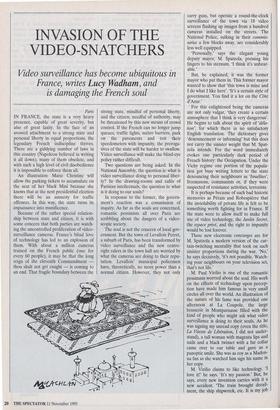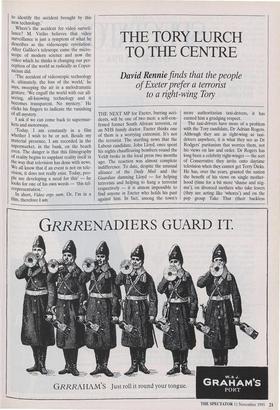INVASION OF THE VIDEO-SNATCHERS
Video surveillance has become ubiquitous in
France, writes Lucy Wadham, and
is damaging the French soul
Paris IN FRANCE, the state is a very heavy presence, capable of great severity, but also of great laxity. In the face of an avowed attachment to a strong state and personal liberty in equal proportions, the legendary French indiscipline thrives. There are a giddying number of laws in this country (Napoleon believed in writing it all down), many of them obsolete, and with such a high level of civil disobedience it is impossible to enforce them all.
An illustration: Marie Christine will allow the parking tickets to accumulate on the seat of her black Mini because she knows that at the next presidential election there will be an amnesty for traffic offences. In this way, the state turns its impuissance into munificence.
Because of the rather special relation- ship between state and citizen, it is with some concern that both parties are watch- ing the uncontrolled proliferation of video- surveillance cameras. France's blind love of technology has led to an explosion of them. With about a million cameras trained on the French public (one for every 60 people), it may be that the long reign of the eleventh Commandment thou shalt not get caught — is coming to an end. That fragile boundary between the strong state, mindful of personal liberty, and the citizen, needful of authority, may be threatened by this new means of crowd control. If the French can no longer jump queues, traffic lights, metro barriers, park on the pavements and test their speedometers with impunity, the preroga- tives of the state will be harder to swallow. Video surveillance will make the blind-eye policy rather difficult.
Two questions are being asked. In the National Assembly, the question is: what is video surveillance doing to personal liber- ty? In the drawing-rooms and cafés of Parisian intellectuals, the question is: what is it doing to our souls?
In response to the former, the govern- ment's reaction was a commission of inquiry. As far as the souls are concerned, romantic pessimists all over Paris are scribbling about the dangers of a video- scopic society.
The soul is not the concern of local gov- ernment. But the town of Levallois Perret, a suburb of Paris, has been transformed by video surveillance and the new centre- right rulers in the town hall are worried by what the cameras are doing to their repu- tation. Levallois' municipal policemen have, theoretically, no more power than a normal citizen. However, they not only carry guns, but operate a round-the-clock surveillance of the town via 18 video screens flashing up images from a hundred cameras installed on the streets. The National Police, sulking in their commis- sariat a few blocks away, are considerably less well equipped.
`Personally,' says the elegant young deputy mayor, M. Spatzola, pressing his fingers to his sternum, 'I think it's unbear- able.'
But, he explained, it was the former mayor who put them in. This former mayor wanted to show that 'this town is mine and I do what I like here'. 'It's a certain style of government. You find it a lot on the Cote d'Azur.'
For this enlightened being the cameras are not only vulgar, 'they create a certain atmosphere that I think is very dangerous'. He begins to talk about the spirit of 'dila- tion', for which there in no satisfactory English translation. The dictionary gives `denouncement or informing' but this does not carry the sinister weight that M. Spat- zola intends. For the word immediately evokes one particularly dark period of French history: the Occupation. Under the Vichy regime one portion of the popula- tion got busy writing letters to the state denouncing their neighbours as 'Israelites', freemasons, communists or, if they were suspected of resistance activities, terrorists.
It is perhaps because of such bad historic memories as Petain and Robespierre that the inviolability of private life is felt to be something worth fighting for in France. If the state were to allow itself to make full use of video technology, the Tardin Secret, the espace wive, and the right to impunity would be lost forever.
These new electronic concierges are for M. Spatzola a modern version of the cur- tain-twitching mentality that took on such sinister proportions during the war. 'No,' he says decisively, 'it's not possible. Watch- ing your neighbours on your television set, that's not life.'
M. Paul Virilio is one of the romantic pessimists worried about the soul. His work on the effects of technology upon percep- tion have made him famous in very small circles all over the world. An illustration of the nature of his fame was provided one afternoon at La Coupole, the large brasserie in Montparnasse filled with the kind of people who might ask what video surveillance is doing to their souls. As he was signing my unread copy (even the title, La Vitesse de Liberation, I did not under- stand), a tall woman with magenta lips and nails and a black twinset with a fur collar came over to our table and gave us a panoptic smile. She was as coy as a Madon- na fan as she watched him sign his name in her copy. M. Virilio claims to like technology. 'I love it!' he says. 'It's my passion.' But, he says, every new invention carries with it. a new accident. 'The train brought derail- ment, the ship shipwreck, etc. It is my job to identify the accident brought by this new technology.'
Where's the accident for video surveil- lance? M. Virilio believes that video surveillance is just a symptom of what he describes as the videoscopic revolution. After Galileo's telescope came the micro- scope of modern science and now the video which he thinks is changing our per- ception of the world as radically as Coper- nicism did.
`The accident of videoscopic technology is, ultimately, the loss of the world,' he says, sweeping the air in a melodramatic gesture. 'We engulf the world with our all- seeing, all-knowing technology and it becomes transparent. No mystery.' He clicks his fingers to indicate the vanishing of all mystery.
I ask if we can come back to supermar- kets and motorways.
`Today, I am constantly in a film whether I wish to be or not. Beside my material presence, I am recorded in the supermarket, in the bank, on the beach even. The danger is that this filmography of reality begins to supplant reality itself in the way that television has done with news. We all know that if an event is not on tele- vision, it does not really exist. Today, peo- ple are developing a need for this' — he looks for one of his own words — 'this tel- erepresentation.'
In short, Video ergo sum. Or, I'm in a Alm, therefore I am.



















































































 Previous page
Previous page